
Below is the first part of an interview Paul conducted live on stage with Muriel Gray for FantasyCon on Sep 25th, 2004. ...
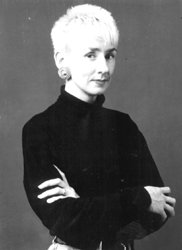
Paul Kane: We're fortunate enough to have with us tonight an author and broadcaster who needs very little introduction, but I'm going to provide one anyway whether she likes it or not.
Muriel Gray: (laughing) Because it's written down.
Paul Kane: (laughing) Because it's written down, yeah. Born and brought up in East Kilbride, Muriel Gray graduated with an honours degree in Fine Art from the Glasgow School of Art…
Muriel Gray: (shaking head and laughing) I wasn't brought up in East Kilbride, sorry.
Paul Kane: Where were you born?
Muriel Gray: I was born in East Kilbride, but we moved when I was about six months old. I was brought up in Glasgow
Paul Kane: Glasgow, okay…Erm…You did graduate with honours from the Glasgow School of art, though…?
Muriel Gray: (laughing) I did, yes. Sorry.
Paul Kane: She worked in illustration and three-dimensional design before becoming Assistant Head of Design in Edinburgh's largest museum, the National Museum of Antiquities. Her broadcasting career began in 1982 as co-presenter of Channel 4's music show, The Tube, with Paula Yates and Jules Holland. She soon became one of the most recognised faces on the station (Muriel smiles at the audience) which led to a career in TV and radio encompassing everything from arts and media to current affairs. She began her own production company in 1987, initially called Gallus Besom, Scots for 'Cheeky Bitch'…Can't imagine where that came from (both laugh). This became Ideal World Productions, which went on to become one of the biggest TV companies in the UK, responsible for such shows as Location, Location, Location, Driven, Equinox and Deals on Wheels. She was the first woman Rector of Edinburgh University, a post she served for three years, has presented the Booker Prize, and this year was one of the judges on the BBC's End of Story writing competition. Her own writing career kicked off with a non fiction book about mountaineering called The First Fifty. She also fronted a show about this called The Monroe Show which featured rapping mountain climbers at the start… Isn't that right.
Muriel Gray: (laughing) Please, no, don't. I've had years of therapy to forget that.
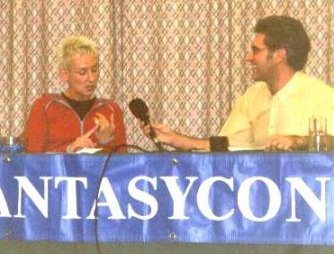
Paul Kane: (laughing) I'm glad I brought that up. Her first fiction book came out in 1994, the much acclaimed horror novel The Trickster about an age-old evil, which Time Out called 'A smashing Debut' (Muriel laughs). Furnace followed in 1997 and continued this theme of supernatural menace, guaranteed to give you a terrifying dose of the Heebie-Jeebies, according to the review in Company. Her third novel, The Ancient, appeared in 2001 and was called by Stephen King no less, 'Scary and Unputdownable'. Recently she's been working on a much anticipated film script, she is FantasyCon 2004's very special Guest of Honour, would you please give a big round of applause for Muriel Gray.
(Audience claps)
Muriel Gray: (laughing) Give Paul the round of applause…
(More clapping)
Paul Kane:To begin with, I'd just like to ask do you get out to these sort of-
Muriel Gray: Do I get out much? Is that what you're asking? (laughs) No, I'm having a great time. So far I've had soup, I've had my Tarot read, I've had a sauna and a swim, and I've watched some porn. £7.95, both films.
Audience Member: Any good?
Muriel Gray: (laughing) No…and apparently it says this will only be charged to your room, presumably so you don't come down from your room in the morning and they say, (effects comical voice) "So, checking you out. Did you enjoy Hot Sexy Nurses?"
Paul Kane: Well it is all expenses paid…
Muriel Gray: (laughs) So yes, you can tell I don't get out much. I'm having the time of my life.
Paul Kane: Okay, first serious question is probably the most obvious one. As a TV presenter why did you venture out into horror writing; is horror something you've always been interested in?
Muriel Gray: Absolutely yes. I mean I wanted to be a horror writer before…I never wanted to be a TV presenter, but I did want to be a horror writer. So, the TV presenting was just a small distraction. But I tried it earlier on when I was very young and stupid, but it was so terrible it took me quite a long time to get better at it. I wasn't taken very seriously the first time, when I wrote The Trickster, in fact I remember coming to a British Fantasy Convention the first time and people were like (grunts in a comical way), like I'd just stuck a pin in the genre and picked horror. In fact Graham Joyce (points him out in crowd) gave me a very hard time and bullied me.
Graham Joyce: It's a lie.
Muriel Gray: (laughing) He just went, "Oh yeah, what have you read then?" So I had to go back in time and give him a list, to prove my credentials: that I've been reading horror since I was ten, but I believe I passed the test though. But I have, yes, I've been a fan since I was a child.
Paul Kane: I read somewhere that you used to go into libraries and get ghost stories out.
Muriel Gray: (nodding) I did, yes. And the Penguin Book of Horror was obviously a huge influence. There were some terrible, terrible stories, y'know? But I was a huge fan of horror, and R. Chetwynd-Hayes was one of the writers in there. I thought he was a kind of Graham Greene of horror writing, always wrote about bed-sits and people with big bellies, husbands in cardigans chopping their wives' heads off. In fact I was watching…my husband bought me a DVD set of The Hammer House of Horror, do you remember that - the kind of 1970s, hour-long thing? Zoe Ball's dad's in one. We were watching it the other night, 'The House that Spurted Blood' or something; it's just fantastic. I love all that stuff…I love literary horror too (laughs).
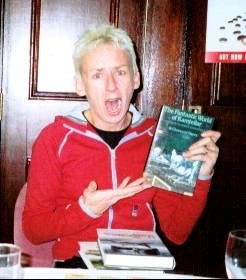
Paul Kane: I should just point out that Muriel's doing some readings of R. Chetwynd Hayes stories later on.
Muriel Gray:Well, I've changed my mind, because I've just been looking at some and thought I can't do this (laughs). It depends what time it is and what you want me to read.
Paul Kane: And how much you've had to drink.
Muriel Gray: Exactly. No, but I'd love to…But it is a wee bit too much, I was saying I've got away for the night from reading my children bedtime stories and now I have to do it for a bunch of bloody adults. (laughs) Listen, I'm not reading it again, go to sleep now!
Paul Kane: Was it hard to make the transition from non-fiction to fiction with your first book being about mountaineering?
Muriel Gray: No, because I mean I rattled off the book about mountaineering in six weeks in the mornings before I went to work. It wasn't exactly Tolstoy. So no, but I always wanted to write fiction which is a very time consuming and painstaking process compared to writing funny essays about going up mountains - so I don't consider myself a non-fiction writer. The two are unconnected.
Paul Kane: Can you explain what 'Monro Bagging' is for people who don't know.
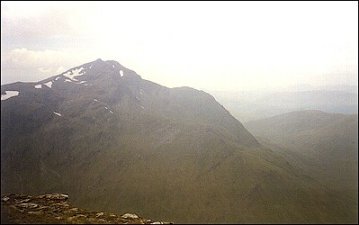
Muriel Gray: (draws in breath) Well, Monros are mountains over 3,000 feet in Scotland of which there are 257, and some idiot decided it would be a great idea to tick them all off. The Scottish Mountaineering Council made this book listing them all, gave them numbers. It's a bit like trainspotting, so suddenly the hills are full of these people in anoraks saying I've done number 120…So it turns mountaineering from an experience where you're just enjoying the conditions to a ticking off numbers exercise, so that's what my book was about. But it's huge now. Wasn't my fault; Scottish Mountaineering Council.
Paul Kane: Why did you choose the topic of Indian folklore and its superstitions for your first book?
Muriel Gray: It was because I was working in Canada, in Banff in the Rockies and I was just inspired by the place I was in, and I had quite a lot of dealings with the Native Canadians - you know - who had a reserve at Cochran, and they were all totally screwed up: alcoholic, absolutely terrible deprivation. So it came actually from being in the place, and being inspired by the Scottish connection as well, because of the Scots that built the railway that opened up Canada. So it's just inspiration from where I was at the time.
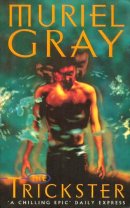
Paul Kane: Was it a conscious decision to set it in Canada, were you trying to appeal to overseas markets?
Muriel Gray: No, because I was inspired by being in Canada it would have been daft to set it anywhere else (laughs) I'm so sorry…You're doing terribly well (laughs). No, I mean I wasn't being cynical writing this, because obviously my next two novels have Americans in them as well. I'm just absolutely fascinated by the American working class. I can't help it…as most of us are. Because I mean, their culture's been our culture. I just grew up in a house with lots of television because my parents said if we turned it off the valves would need to heat up again. So we didn't get any of that - your kids are only supposed to get an hour of TV. It was on from the moment you got in to when the white dot went off. So everything I grew up with was observing by osmosis American culture, in tandem with your own. We understand their culture very well, but have no idea about ours - which makes us bi-lingual in a way. Those are the things that fascinated me because in the second novel…ah, you see if we talk about the second novel that'll throw your questions right out and I can't do that to you…I've just got to let you do it, so I won't mention another novel (laughs).
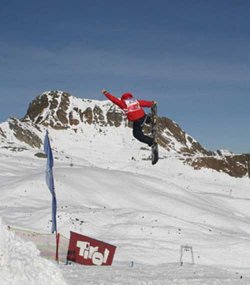
Paul Kane: There's a love of mountains and snowy pursuits in The Trickster, so obviously you're into…
Muriel Gray: Snowy things (nodding). I was a snowboarder for about eleven years; we did this television series called The Snow Show about fifteen years ago when snowboarding was just starting. And we made fun of it, until we tried one on, and just never skied again, it was brilliant. But last year I broke my wrist…standing still. I'm a very fast and very good snowboarder, but I was standing and turned round and fell over. So I can't do it anymore because it's just stupid, plus I'm far too old. Take off your balaclava and they say, whaww, it's an old woman snowboarding! In my head I'm seventeen, but take off the balaclava and it's a 46 year old housewife from Anniesland who frightens young children on the slopes. So I've gone back to skiing like old people. Old people play tennis and golf, and they ski, so I've decided I've just got to be an old person.
Paul Kane: How long did it take you to write the book all in all?
Muriel Gray: The Trickster? Where are we now on the questions? (laughs) I think over about a period of a year, but obviously if you like timed it per sentence probably about…a fortnight (laughs). No, I overwrote than one horribly, so they've got shorter and shorter as time goes by - you self-edit yourself.
Paul Kane: How long was it, about 250,000 words?
Muriel Gray: I've no idea…far too long. Ludicrous, sentimental…Honestly. But what do I know, people like sentimental stuff.
Paul Kane: Did you plan it out? Because it runs in two parallel time zones, 1907 and present day…Did you plan all that out before you started?
Muriel Gray: Yeah, I mean I had to do all that carefully on a big board - because there were so many plotlines coming in. It would have been far too complicated, I can't keep that kind of stuff in my head; I need a felt pen (laughs).
Paul Kane: I found the breakdown of Sam Hunt - who's the main protagonist - I found his psychological breakdown almost as horrific as the confrontations with the Trickster itself. Do you find psychological stuff as frightening, or more frightening than the supernatural?
Muriel Gray: Oh, more frightening obviously. Because it's real, and supernatural stuff is made up…(looks at audience) I don't know how to break it to you…I'm so sorry, but there's no demons. It's just made up. But I mean obviously, without trying to be pretentious, clearly what you're trying to do in the subtext is show somebody wrestling with inner demons that become manifest. That's not exactly unique or original, but that was what I was digging away, trying to do. So if you enjoyed the psychological breakdown of a man and his family then I'm well pleased, young man (laughs).
Paul Kane: Do you think it helped or hindered when marketing the book that you were well known in another field, TV presenting?
Muriel Gray: It hugely hindered, in fact I begged HarperCollins to let me… (mobile in audience goes off) Oh, I'll take that; I ordered a pizza by the way (laughs) Tell them we're busy…No, it was two things: I wanted to write it under a pseudonym and write it under a boy's name because 1) Girl's aren't taken seriously, and 2) Girl TV presenters aren't taken seriously at all. I don't take any girl TV presenters seriously…(laughs). But they wouldn't let me, or well, they would let me but they wouldn't have given me an advance…Hmm, let me think about this for thirty seconds…But I took an enormous amount of abuse from people, which I thought was unfair. And it's taken a long time for people to realise you're serious about what you do. At the moment - again, I'm spoiling your question order - but I've stopped writing horror. So self destructive…Oh, I've done it now - and then stopped. But I'm about to start again.
Paul Kane: It's like when you win the Oscar early on in your career, you think where do I go from here?
Muriel Gray: Yes, exactly, exactly. I do prefer abuse to flattery; I thrive on it…Just as well. I don't trust flattery, but I trust abuse.
(big audience laugh)
Paul Kane: The second book, Furnace, was influenced by M.R. James. How much of an impact has James had on your writing?
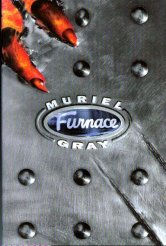
Muriel Gray: Oh, a massive influence. Here's someone who terrified me… I did it deliberately as an homage to M.R. James who was a massive influence on me, he was just one of the most skilful and beautiful writers of peripheral horror, y'know? Things that you can't quite see, or understand, being much more terrifying. I remember the Jacques Tourneur film that was based on 'Casting the Runes', Night of the Demon with Dana Andrews and so on, and they fought really hard to keep the demon out of it, and the producers put this big rubber demon in at the end. And up until that point it was…you know, it was suspenseful, terrifying, it stayed really, really accurately to the story - I mean relatively, obviously, with American girls in it etc. So I was trying to take it all in a different direction.
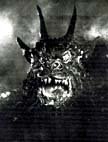
Paul Kane: Which is your favourite M.R. James story?
Muriel Gray: Ah, there's so many of them… 'Casting the Runes', obviously. I loved 'Lost Hearts' 'The Mezzotint', 'The Ash Tree'…I could go through the whole lot of them. And I tell you in the 1970s - at the end of the 1970s - there was a BBC TV series that did a number of M.R. James stories, dramatised them - in fact Jonathan Miller did 'Whistle and I'll Come to You, My Lad', and they were absolutely brilliant - I mean again, they haven't dated either. There was just a quiet, understated terror…But do you remember The Woman in Black? It was one of the best dramatisations ever. You can't get it on DVD, you can only buy it from the States for like £250. I mean, duh! Put it out on DVD, we'd all buy it. I'd buy it.
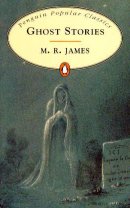
Ramsey Campbell: 'Whistle and I'll Come to You' is on DVD…
Muriel Gray: That is, yeah, I've got that: it's BFI. 'I've got Whistle and I'll Come to You, My Lad', and 'A Warning to the Curious'. But they haven't got the other ones - they haven't got 'Lost Hearts', they haven't got any of the others. They've got The Signalman or what-have-you, which is Dickens and not M.R. James before you shout at me (smiles). Graham Joyce. Oh yeah, heard of Dickens, have you? (laughs)
Paul Kane: Was it Tales of the Unexpected that did 'The Ash Tree'?
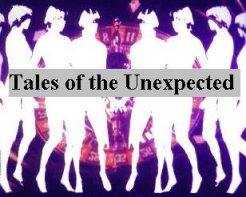
Muriel Gray: No, Tales of the Unexpected was Roald Dahl (mimicks the flame-dancing lady from the start).
Paul Kane: I think they did do one.
Muriel Gray: Did they? Did they?
Ramsey Campbell: There was an adaptation, it wasn't Tales of the Unexpected.
Muriel Gray: Oh, I remember, it was the one that started with the big funfair (hums theme)
Audience Member: Journey to the Unknown?
Muriel Gray: Thank you, that was it! (continues to hum the rest of the theme).
(Audience laugh)
Paul Kane: Did you catch the Chris Lee readings a few Christmases ago?
Muriel Gray: Oh yeah, I did yes.
Paul Kane: What did you think?
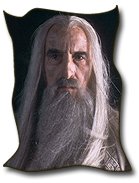
Muriel Gray: Obviously I'm a massive fan, until I heard him being interviewed about Lord of the Rings. I heard Simon Mayo trying to stop him from speaking on Radio Five Live, it was one of the funniest things I've ever heard (effects Chris Lee voice) "Ah, Elvish was originally based on Hebrew…" (pretends to fall asleep) And then they cut the poor guy out of the movie! I mean honestly. No, but I love Christopher Lee. A friend of mine was working on a movie with him and said he does have a sense of humour. He did something very funny. He said all these kids were coming up to him and saying, "I'm going to set fire to your car," and everything. And one said, "Were you a vampire, mister?" and he said, (effects gruff voice) "Yes, and soon it will be dark." (laughs) They all ran. And then they went further up and they stopped at this bridge near Skye and all these old aged pensioners got out of a coach and he came out and went up to them and said, (effects gruff voice) "What year is it?" (screams).
(audience laugh)
Muriel Gray: So he obviously has a wit, but not on the Simon Mayo show.
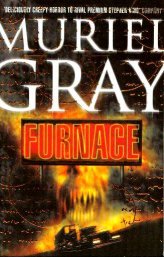
Paul Kane: Because the main character in Furnace is a trucker you had to…well, you didn't have to do, but for research purposes you rode across America with Ray…
Muriel Gray: Ray Kasicki, yeah.
Paul Kane: Any stories about that?
Muriel Gray: No, none at all… (laughs) …No, I wrote to the Association of Truckers and said, look, you might think I'm mad but is there a trucker who'd be willing to take me…
Paul Kane: To take you?
Muriel Gray: Just to take me, really (laughing) For goodness sake, man…(laughs). And so Ray volunteered, and he was so sweet. We went in this great big Peterbilt called..er..Thumper, this massive thing, a flatbed. And I'm so passionate about trucks, in fact all three books are actually about big pieces of machinery: the first one was about trains, then trucks, then ships…I can't help it. And so, I mean, it was just one of these things…But it was so exciting because he lives in Cleveland, Ohio, and we drove all up and down the Eastern Seaboard for about a month, sleeping in this little cab, head to toe in a little sleeping bag. He used to eat a lot of jelly and was very big. He was a Vietnam vet and had a slight tick in his eye (laughs) and he could not understand a word I said, and so I would try and he would just go (effects US voice) "Ah, wow," so we just entered into this companionable silence after a while because there was simply no point in trying to make any conversation. I speak far too quickly, in a Scottish accent. But by the end of the month I was (effects US voice) startin' to talk like that, and then he could understand me. But we had some amazing times, and I did see a side of America lots of Americans have never seen. It's like a twilight world these truckers live in, it was really great. But the problem I had was when I got home I wanted to write a book about trucking, and so I had to really censor myself and keep out all that stuff, and not actually go on about trucking too much, and just remember I'm like, trying to tell a horror story - and here comes a demon, ahhh. So it was great, yeah. I loved it…I still get Christmas cards from him.
Paul Kane: Do you?
Muriel Gray: I do. They send me photographs of their dog (laughs) And I do get a Trucking Association of America Calendar every year so…I'm very proud of that. It's always got big shots of big, shiny trucks.

Paul Kane: How much of Ray is actually in the character of Josh Spiller.
Muriel Gray: (laughs) Absolutely none! Ray is this kind, big guy with a wife and a dog. Josh Spiller's like a sexy guy, y'know. But he's totally made up because there are no sexy truckers.
(audience laughs)
It's a very strange world they work in that they all have this respectful distance, but all loathe each other. They're all vying for the same jobs too, they've got agents…see I'm interested in trucks and you all get to hear about it…No, we're here to talk about horror; I could talk to you all night about trucking. (laughs) I was about to tell you the ins and outs of picking up aluminium rolls but I'll just keep it to myself.
(audience laughs)
Paul Kane: Some of it actually made it into the book.
Muriel Gray: Yes, some of it, but I had to stop myself because that's not what people buy my books for. (laughs) How to load up a flatbed…
You can catch Part Two of this interview here
Interview (C) Paul Kane & Muriel Gray, September 2004.